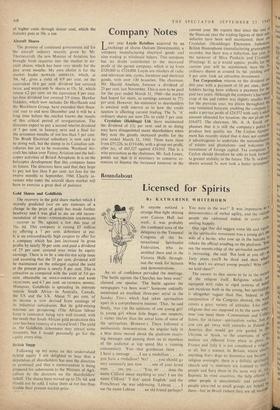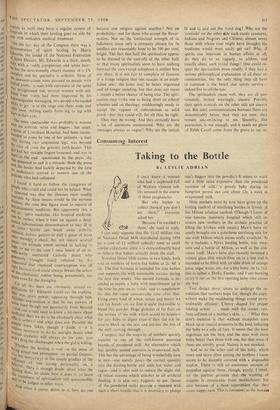Roundabout
Licensed for Spirits
By K ATHARINE WHITEHORN
IF anyone noticed a strange blue light shining over Caxton Hall last week, it was probably the combined aura of the delegates to the Triennial Congress of the In-
teinational Spiritualist Federation, who as- sembled there and in the Victoria Halls through- out the week for lectures and demonstrations.
An air of confidence pervaded the meetings. The battle against the Churches has been won!' claimed one speaker. 'The battle against the newspapers has been won!' Someone unkindly mentioned an excellent three-part serial in the Sunday 'films which had taken spiritualism apart in a comprehensive manner. 'That,' he said firmly, 'was Ott the opinions of one young girl' (a young girl whose little finger, one suspects, ie rather thicker than the astral loins of some of the spiritualists. However.). There followed a mediumistic demonstration. An angular lady in a blue dress moved about the platform receiv- ing messages and passing them on to members of the audience at top speed like a running commentary. 'You—that gentleman there . . I have a message . . . I see a medallion . . . do you have a medallion? No? . . , you should go very cautiously just now . . . one of your loved ones . . . yes, yes. . . ."You, sir . . . does the name Clifford mean anything to you? I see the name Clifford.' I don' speak English,' said the Frenchman she was addressing. 'Lebrun . . . see the name Lebrun . . . an old friend perhaps? You were in the war?' It was impressive as demonstratioa of verbal agility, and the various people she addressed ended, in eke? v ease' smiling happily. One sign that did suggest some life and vig°Lif to the spiritualist movement was a young girl. the wife of a healer, who rose up in the balconY to rebuke the official windbag on the platform."inn say the membership of the spiritualist movement is increasing, she said. 'But look at you all--111 forty years you'll be 'dead and then w119..? Why don't we attract young people? Why cant we hold them?'
The answer to that seems to lie in the nature of the religion itself. Religions which 8.1.i equipped with rules or rigid systems of hell, can inculcate both in the young, but spiritual's"' is altogether vaguer than that. Indeed, as the composition the Congress showed, the win'd covers a great variety of attitudes. Like 0t11`r religions that are supposed to be the same whet ever you meet them—Communism and Cathy,. Iicism, for instance--spiritualism varies. Just 3; you can get away with remarks in Poland tIe America that would get you gaoled in Ukraine or Spain, so the assertions of srni'l tualism are different from place to place, . to France and Italy it is, not considered a religi°1 at all, but a science. In Britain, where a1111`", anything from dogs to dynamics can becoine.,i religion overnight, there is a definite spiritual'v church and its ministers are licensed to ril3If' people and bury them in the same way as. 51(i' Baptists. In most countries, the help offered other people is unsystematic and personal_ people attracted to small groups are helped 17 them—but in Brazil (where they are all incarno THE SPECTATOR, SEPTEMBER 23, lionists as well) they have a regular system of hospitals in which their healing goes on side by side with orthodox medical treatment.
Cln the laE: day of the Congress there was a denionstration of spirit healing by Harry LIWards, the leader of the National Federation of Spirit Heaters Mr. Edwards is a thick, sturdy he with a ruddy complexion and white hair: Be has the determinedly cheery manner of a TV e,nloPere and his speciality is arthritis. Most of the demonstrations were devoted to people with locked joints. a man with curvature of the spine ‘as straightened out. several women with stif- i,veued knee Huts had them improved by his knowledgeable massaging: two people who needed tsticks to get to the stage cast them aside and 'vere soon •.hifting easily from leg to leg with stars in their eyes The most spectacular was probably a woman With an arthritic wrist and fingers: her sister, ,,k nurse of L'wisham Hospital, had been recom- mended to come by one of her patients—a man Who having two amputated legs, was beyond the cure of /yen the greatest faith-healer. This girl had her straight fingers loosened, and was in "411's at the end: questioned by the press. she ans prepared to call it a miracle. Both the press an the healer had luckily departed by the time ittribulanc:2 arrived to remove one of the Patients who had collapsed.
found it hard to follow the categories of People who c;:uld and could not be helped. What treatable expected was that the illnesses Most readily by these means would be the nervous ci 'senses, the ones that figure most in reports of 1):Yehosomatic medicine.- But apparently this is, so: spirit .medicine, like hospital medicine. eaq be useless when it runs up against a deep- seated subconscious determination to stay ill at ,1.ateeroiaslt.reiSlpirits can break away arthritic t1/4'isar • throughIce goitres or pull a piece-of bone cheek, but not restore SCA CNA! attitude which seemed as lacking in sugle to me Ls the case I once heard of an in- Rrn c,ielitlY instructed Catholic priest who thought (until rebuked by his Periors). that chemical contraception was all 118ht because t ;oil could always thwart the action of the chemicals; rubber being, presumably, too Much even for the Almighty. ,„Eir. 91. all this there are. obviously, several ex- oti6lanations. M • Edwards Would say the explana- At Was spirit power, operating through him. Zuother explanation is that he has powers of .21e kind though not necessarily from Beyond medicine One would need to know a lot more about to,ulene thag we do to be absolutely clear what pacts arthritis and what does not. Possibly the hple were fakes, though I doubt it it is jul°111 necessary to do by outright deceit what credulity will always do for you: you on t drug the champagne when the girl is willing. L eYtkihether the healing is reai—in the sense of "s:tt:g. actual and permanent—or partial (impres- itcfit but temporary) or the simple product of the bey letice of one strong personality on a he: .ver, there is enough doubt about what the
Ming d
the soundness does, let alone how it does it. to leave still t lndness of spiritualism still questionable; 0 be judged in other ways. ' And when it conies down to it. how do you
balance one religion against another? Not on probability—not for those who accept the Resur- rection. Not on the intellectual strength of its followers; since only a 'Company chosen for its intellect can reasonably hope to be 100 per cent. bright. The fact that half the spiritualists appear to be dressed in the cast-offs of the other half, or that many spiritualists seem to have nothing between the ears except ectoplasm is neither here nor there. It is not fair to complain of features in a fringe religion that one accepts in an estab- lished one: the latter may be better organised and of longer standing, but that does not mean stands a better chance of being true. The spiri tualists may strike one as being short on ethical 'schemes and on theology, maddeningly ready to accept the vaguest of coincidences as solid proof --but they could still, for all that, be right.
They may be wrong. And they certainly leave a lot of questions unanswered. Why are the messages always so vague? Why see the initials D and G and not the 4•ord dog? Why are the 'controls' on the other tide such exotic creatures, Indians and Negroes and Chinese, almost never those with whom (one might have thought) the mediums would most easily get on? Why, if spirits can intervene in human affairs at all, 'do they do so so vaguely, so seldom, and usually about such trivial things? One could re- spect the spiritualists more readily if they had a serious philosophical explanation of all. these in- consistencies; but the only thing they all have in common is the belief that spirits survive-- indeed live to tell the tale.
The spiritualists mean well, they are all pas- sionately, indeed wearingly, sincere. Possibly their spirit controls on the other side are sincere too. But until communications between them are demonstrably better than they are now, they remain unconvincing to me. Sincerity, like patriotism, is not enough; and it needs no ghost of Edith Cavell come from the grave to say so.















































 Previous page
Previous page